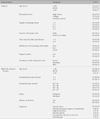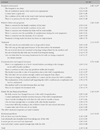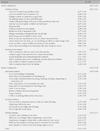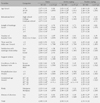Abstract
Purpose
This study determined the level of stress and type of coping style of spouses with high-risk pregnant women.
Methods
Subjects were 102 spouses with high-risk pregnant women at 6 hospitals in Seoul and Gyeonggi province from January to August, 2009. The tools for this study were stress scale and coping scale. The data were analyzed by t-test, ANOVA, Scheffe's test and Pearson's correlation coefficient.
Results
The average score of subjects stress was 2.18 and coping score was 2.46 point out of 4.00. The highest score of stress categories was 2.44 point in emotional problems and the lowest score was 1.72 in communication and support resources. The stress level was significant differences according to length of marriage, number of hospital visits, satisfaction with marriage relationship, hospitalization days and gestational age respectively. Spouses tended to use an active coping style (2.60) rather than a passive coping style (2.31). There were significant differences according to mother's age and gestational age in active coping and educational level in passive coping.
Figures and Tables
References
1. Buist A., Morse C.A, Durkin S. Men's adjustment to fatherhood: Implications for obstetric health care. Journal of Obstetric, Gynecologic, and Neonatal Nursing. 2003. 32:172–180.

2. Choi M.K., Cho Y.R. The effects of life stress, perceived anxiety control, and coping style on anxiety symptoms in college students. Korean Journal of Clinical Psychology. 2005. 24:281–298.
3. Cohen J. Statistical power analysis for behavioral science. 1988. New York, NY: Academic press.
4. Giurgescu C., Penckofer S., Maurer M.C., Bryant F.B. Impact of uncertainty, social support, and prenatal coping on the psychological well-being of high-risk pregnant women. Nursing Research. 2006. 55:356–365.

5. Goh J.I. Relationship with physical discomforts, emotional
status, and nursing needs of the pregnant women with preterm labor. 2008. Seoul: Chung-Ang University;Unpublished master's thesis.
6. Hanyang University, & Management Center for Health Promotion. A study on efficient management of high risk pregnant women in Korea. 2005. Seoul: Hanyang University.
7. Hu Y.L. Study of stress and coping behaviors in families of hospitalized pregnant woman undergoing tocolysis. Hu Li Za Zhi. 2006. 53(6):45–52.
8. Kim H.K. Stress and coping style of women with preterm labor. 2003. Seoul: Seoul National University;Unpublished master's thesis.
9. Kim J.H. Relations of perceived stress, cognitive set, and coping behaviors to depression: A focus on freshmen's stress experiences. 1987. Seoul: Seoul National University;Unpublished doctoral dissertation.
10. Kim S.H. The stress and adaptation in spouses of gynecological cancer patients. 2003. Gwangju: Chonnam National University;Unpublished master's thesis.
11. Lazarus R., Folkman S. Stress, appraisal and coping. 1984. New York, NY: Springer.
13. Lynn M.R. Determination and quantification of content validity. Nursing Research. 1986. 35:382–385.

14. Maloni J.A., Brezinski-Tomasi J.E., Johnson L.A. Antepartum bed rest: Effect upon the family. Journal of Obstetric, Gynecologic, and Neonatal Nursing. 2001. 30:165–173.

15. Maloni J.A., Kutil R.M. Antepartum support group for women hospitalized on bed rest. The American Journal of Maternal Child Nursing. 2000. 25:204–210.

16. Maloni J.A., Ponder M.B. Fathers' experience of their partners' antepartum bed rest. Image. 1997. 29:183–188.

17. May K.A. Impact of maternal activity restriction for preterm labor on the expectant father. Journal of Obstetric, Gynecologic, and Neonatal Nursing. 1994. 23:246–251.
18. Moon D.H. The comparative study with fatigue, anxiety and stress between full-term and preterm pregnancy. 2006. Gwangju: Chonnam National University;Unpublished master's thesis.
19. Moon Y.S. Study on the stress and coping effort of hospitalized children's mother. Korean Parent-Child Health Journal. 2007. 10:147–157.
20. Myers J.K., Lindenthal J.J., Peper M.P. Life events, social integration and psychiatric symptomatology. Journal of Health and Social Behavior. 1975. 16:421–427.

21. Park A.S., Lee Y.H. Influence of the sex role characteristics and stress perception of married women on the coping style for stress. Korean Journal of Counseling and Psychotherapy. 1992. 4:69–80.
22. Park H.S. A study on the degree of stress and coping for the family of psychopathic patient. 1993. Gwangju: Chonnam University;Unpublished master's thesis.
23. Park G.H. The stress and coping skills of hospitalized family of alcoholism. 2007. Seoul: Ewha Womans University;Unpublished master's thesis.
24. Ptacek J.T., Smith R.E., Dodge K.L. Gender differences in coping with stress: When stressor and appraisals do not differ. Personality and Social Psychology Bulletin. 1994. 20:421–430.

25. Queenan J., Spong C., Lockwood C. Management of high-risk pregnancy: An evidence-based approach. 2007. Malden, MA: Blackwell Pub.
26. Sittner B.J., DeFrain J., Hudson D.B. Effects of high-risk pregnancies on families. The American Journal of Maternal Child Nursing. 2005. 30:121–126.

27. Teixeira C., Figueiredo B., Conde A., Pacheco A., Costa R. Anxiety and depression during pregnancy in womenand men. Journal of Affective Disorders. 2009. 119:142–148.
28. Thorman K.E., McLean A. While you are waiting: A family-focused antepartum support program. The Journal of Perinatal and Neonatal Nursing. 2006. 20:220–226.




 PDF
PDF ePub
ePub Citation
Citation Print
Print






 XML Download
XML Download